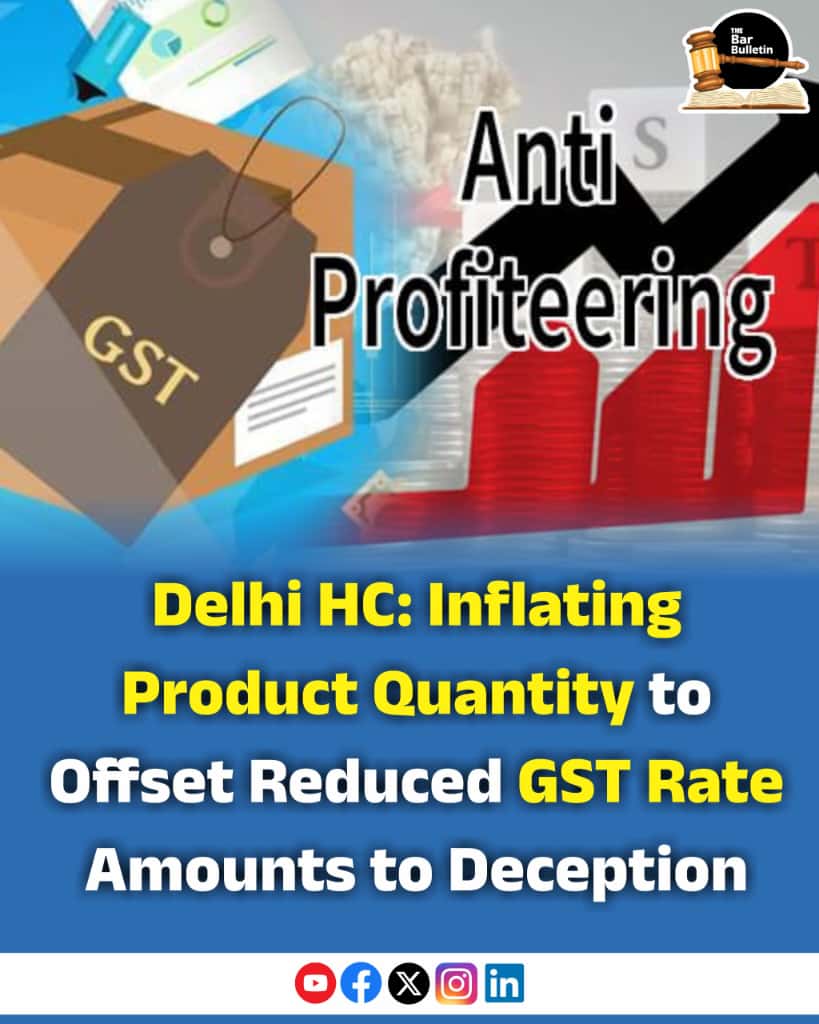In consonance with the scheme of the reduced rate of GST component floated by the Finance Ministry, the Delhi High Court ruled that a sale above the Maximum Retail Price (MRP) is impermissible, and not passing on such benefit of GST rate reduction to the consumers would amount to curtailment of their choice.
The Court clarified that any schemes operated by a dealer ought to have been recalibrated with the reduction in GST rates, and the action on the part of the dealers in increasing the quantity of the product unknowingly and charging the same MRP to ensure that the GST benefit is not passed on to the consumers, is nothing but deception, and such an approach would defeat the entire purpose of reduction of GST rates.
Further, emphasizing that the anti-profiteering measures enshrined in the GST law provide an institutional mechanism to ensure that the full benefits of input tax credits and reduced GST rates on the supply of goods or services flow to the consumers, the Court opined that if the authority concerned under Section 171 of the CGST Act, 2017, confirms that there is a necessity to apply anti profiteering measures, it has the power to order the supplier/business concerned to reduce its prices or return the undue benefit availed by it along with interest to the recipient of the goods or services.
The Court also added that if the undue benefit cannot be passed on to the recipient, the anti-profiteering authority can order the same to be deposited in the Consumer Welfare Fund, and in extreme cases, the ‘authority’ can impose a penalty on the defaulting business entity and even order the cancellation of its registration under GST.
Therefore, pointing out that the purpose of the ‘anti-profiteering mechanism’ is to safeguard consumers’ interests and guarantee that businesses would transfer the benefits of lower tax rates and input tax credits to the final consumers, the Court upheld the order passed by the National Anti-Profiteering Authority (NAPA) directing the Petitioner to transfer Rs. 5.55 lacs to the Consumer Welfare Fund.
The Division Bench comprising Justice Prathiba M. Singh and Justice Shail Jain observed that the purpose of the reduction in GST is to make products and services more cost-effective for consumers, and said purpose would be defeated if the price is kept the same and some unknown quantity is increased in the product, even without the consumer requesting the increased quantity product.
The Bench clarified that the rationale behind the reduction in GST rates is to ensure that the consumer gets the benefit of the said reduction, and a deadline, once fixed by way of notifications, cannot be sought to be violated merely on the ground that some special scheme is being launched or the product is being sought to be given free with some other product or the grammage or the quantity of the product is being increased.
When the Petitioner was asked for an explanation for not reducing the price, the Bench noted that the Petitioner had relied upon some scheme launched by them, wherein the subject product was given with a Dove soap bar as a free product.
Reference was made to the decision of Reckitt Benckiser India Pvt Ltd. vs. Union of India [W.P.(C)7743/2019 dated January 29, 2024], where it was observed that an increase in volume or weight or supply of additional free material by any schemes would not be sufficient to satisfy the requirement of passing on the benefit availed to the consumers.
Briefly, in this case, the Petitioner, who is a distributor of Hindustan Unilever Limited (HUL), deals with various products, one of which is Vaseline VTM 400 ML. In respect of the subject product, initially, the GST payable from July 01, 2017, was 28%, which was later reduced to 18% after the amendment by way of Notification No. 41/2017-Central Tax (Rate) issued on November 14, 2017. When these reductions took place, anti-profiteering measures were introduced to ensure that the benefit of the reduction in rates of GST or the benefit of input tax credit would be passed on to the consumer by way of a commensurate reduction in the rate/price.
In pursuance of the same, a complaint was filed against the Petitioner in respect of the subject product, stating that the Petitioner continued to charge the same amount, despite the reduction in the rate of GST. This complaint was considered by the National Anti-Profiteering Authority (NAPA), where it was held that the Petitioner had profiteered by not passing on the benefit availed by the reduction in GST rates to the consumers. The NAPA, therefore, held that not passing on the benefit of the reduction in the rate of GST by 10% to the consumers was contrary to Section 171 of the CGST Act, 2017, and as a penalty measure, directed the Petitioner to deposit the profiteered amount of Rs. 5.50 lacs to the consumer funds, along with interest at 18%.
Case Relied On:
Reckitt Benckiser India Pvt Ltd. vs. Union of India [W.P.(C)7743/2019 dated January 29, 2024]
Appearances:
Advocate Vipul Agrawal, for the Petitioner/ Taxpayer
Advocates Kumar Visalaksh, Arihant Tater, Ajitesh Dayal Singh, Saurabh Dugar, Ripudaman Bhardwaj, Kushagra Kumar, Amit Rana, Ruchesh Sinha, and Upasn Vashisth, for the Respondent/ Revenue

